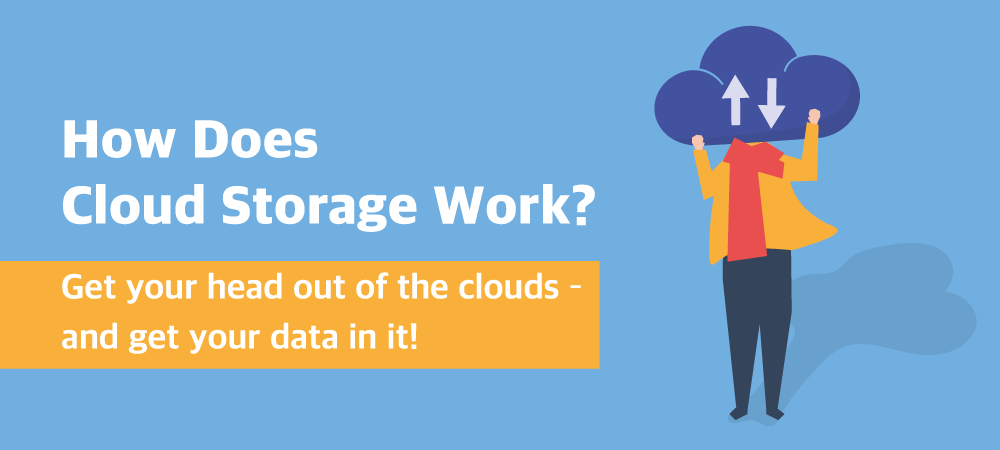
How Does Cloud Storage Work?
Cloud this, cloud that. Does anybody else remember when clouds were just a weather phenomenon? Dad jokes aside, cloud storage is a huge part of today's tech world. Lots of people use cloud storage all day long, uploading and downloading everything from office documents to photos from a weekend hike.
However, the cloud can be a little tough to wrap your head around. Where does all that data go if it's not being saved on your phone or computer? How does the data get to its destination, and why is the technology so popular? We're going to break it down for you in our five-minute primer on cloud storage.

How Does Cloud Storage Work? The Basics
Essentially, cloud storage is the practice of storing your data remotely on computer equipment that another organization owns and maintains. You sign up for an account, sometimes paid and sometimes free, that gives you access to a certain amount of the cloud provider's server space. In return, the provider allows you to store your data there and access it at your convenience.
Cloud storage can mean your own personal or business storage, like a Google Drive account. It can also mean the cloud storage that businesses use to make their products available to end users. In both cases, data gets stored on remote servers and accessed via the internet.
Want to upload a file into the cloud or download a file from it? All you'll need is an internet connection and (sometimes) your login credentials for the cloud storage service. It is accessible through both WiFi and mobile 4G/5G data. That means people can quickly and easily access all kinds of files through their laptop, desktop or mobile device.
Life in the Cloud
Cloud storage can hold anything from documents to videos to apps to saved video games. Google Drive, Microsoft OneDrive and Apple iCloud are the three best-known examples of cloud storage services. Hundreds of millions of people use these apps for work, school and just having fun.
But a huge number of other services we use today also involve accessing cloud storage or services. When you watch TV on your favorite streaming app, the video streams from the cloud. Download a new smartphone app and it comes to your phone via the cloud. Save your game on the PS5 and your save goes to the cloud.
Thus, there's no doubt that cloud storage is a huge part of how most of us live and work. Its convenience and flexibility have made it indispensable for a lot of people's workflows - not to mention entertainment and leisure. However, the cloud still has some important weaknesses that make physical storage media like USB flash drives a stronger choice in a lot of use cases.
Explore Unlimited Options for Custom Flash Drives!

Advantages of Physical Storage vs. the Cloud
There are still plenty of advantages to using physical storage media like USB flash drives. Some of the biggest perks of physical storage include:
- Internet Connection: Possibly the single biggest downside of cloud storage is its reliance on an internet connection. In areas without WiFi or mobile data service, you could find yourself unable to access your most important files. Even in areas with internet, you might still deal with excruciatingly slow download speeds if there's not enough bandwidth available. And if your ISP goes down, there's no telling how long you could be without access to the cloud.
- Ownership: You don't physically own any of the equipment that your cloud files are stored on. While this can potentially reduce your expenses in the short-term, it also turns storage into an ongoing expense rather than a one-time purchase.
- Cost: While a lot of cloud storage services offer free accounts, these often don't cut it for business use. Professional-grade cloud storage can be much more expensive. Bulk flash drives, meanwhile, are extraordinarily cost-effective, even in large flash drive sizes like 128 GB or 256 GB.
- Security: When you store files in the cloud, you're relying on the security measures of the cloud provider to keep them safe from unauthorized access. That can be a real concern, considering that 40 percent of organizations surveyed in one study reported a cloud data breach within just a 12-month period.
- Terms of Service: You're bound by provider's terms of service when using their storage service. If the provider decides to raise their prices or otherwise change their offerings, your options are to either accept it or migrate your data to another storage solution.
Shop Bulk USB Drives at Unbeatable Prices

At the end of the day, both cloud storage and physical media have their place in our tech landscape. Need cost-effective and highly customizable physical media for your data storage? USB Memory Direct's bulk flash drives are available in dozens of varieties - including fully custom shaped USB drives!
Interested in learning more about the tech behind storage media? Read our article - What is Flash Memory? - and get up to speed on another crucial 21st century technology.